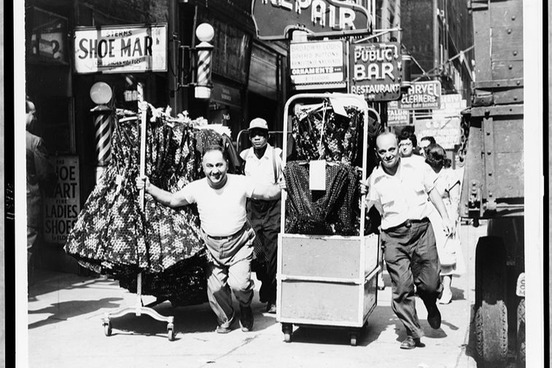
Prêt–à–porter
prêt-à-porter, noun : ready-to-wear clothes
"One of the industry's true characters, Valentino Garavani has worked in fashion for 65 years, starting as an apprentice before launching a couture and pret-a-porter label known throughout the world for glamour and luxury."
—Katie Dailey, Time Out, 25 February 2014
Prêt–à–porter (pronounced like "pret-ah-por-TAY") can also be styled without those fussy little diacritics, pret-a-porter, which seems more in keeping with the word's meaning. Prêt-à-porter is decidedly French, which can make it seem like a fancy word, but in fashion it contrasts with the truly fancy haute couture, which refers to the most fashionable of the fashions, and the houses and designers that make them. Prêt-à-porter is the stuff that can be bought in a store and worn by regular folk. Another word that contrasts here is bespoke, which describes clothes that are custom-made.
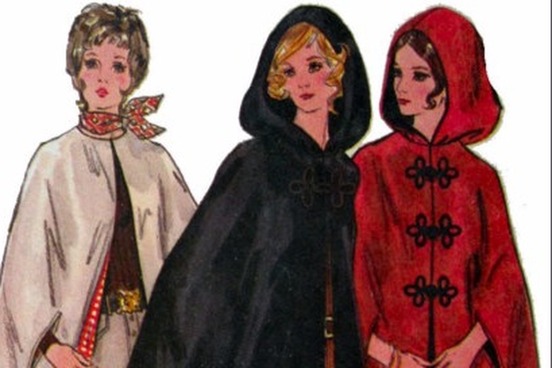
Frog
frog, noun : an ornamental braiding for fastening the front of a garment that consists of a button and a loop through which it passes
"Although the version that appeared at the end of this morning's runway show was sans tails …, it was elegant, a shawl-collar jacket with a frog closure, over a pleated-bib, wing-collar, formal tux shirt with black bow tie."
—Adam Tschorn, The Los Angeles Times, 20 January 2009
We don't know how these pretty little bits of braiding came to be called frogs, but that is indeed what they're called. The word also refers to a looped device attached to a belt for holding a weapon or tool. Both uses are more than 300 years old, and no one who can explain the connection to amphibians—if there is one—is around anymore.
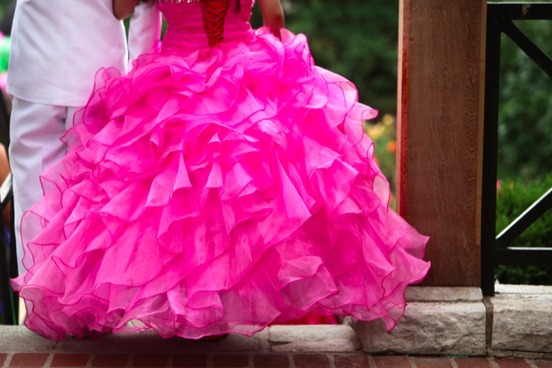
Furbelow
furbelow, noun 1 : a pleated or gathered piece of material; especially : a flounce on women's clothing 2 : something that suggests a furbelow especially in being showy or superfluous
"Eschewing the frills and furbelows of a more showy brand of the dance form, [flamenco dancer] Yaelisa delves into her own Sephardic Jewish family roots with 'Raices,' a premiere on this program.
—Mary Ellen Hunt, The San Francisco Chronicle, 18 February 2016
It's a flounce, a frill, but furbelow sounds emphatically less attractive. In French it sounded a little different—the French word was farbella—but the word was adopted into English with English-sounding parts in a process known as folk etymology. Falbala is another version of the same word, but it's never been as popular.
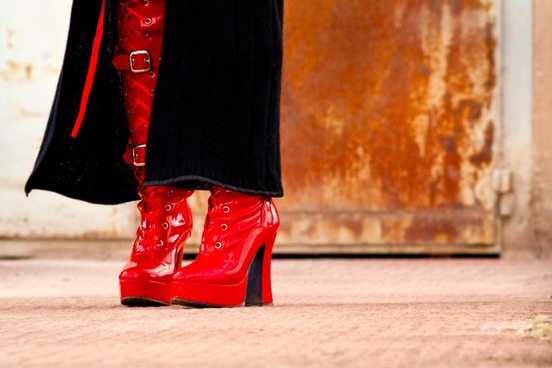
Vamp
vamp, noun 1 : the part of a shoe upper or boot upper covering especially the forepart of the foot and sometimes also extending forward over the toe or backward to the back seam of the upper 2 : a short introductory musical passage often repeated several times (as in vaudeville) before a solo or between verses
A vamp is the part of the shoe that covers the front of the foot. The word comes from the Old French avanpié (from avant-, meaning "fore," + pié, meaning "foot"). There's an old verb form of vamp which meant "to provide (a shoe) with a new vamp," thereby refreshing the shoe; this led to vamp's use as a term for patching something up or improvising.
The front of the vamp is called the throat.
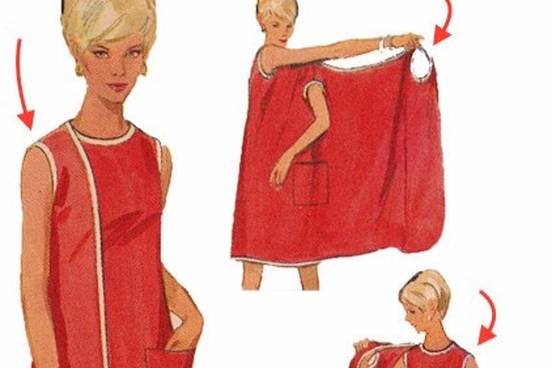
Armscye
armscye, noun : armhole; specifically, in tailoring and dressmaking : the shape or outline of the armhole
"Getting the shoulder just right is tricky—I had to move the top of the armscye out towards the shoulder and raise the bottom of the armscye because it gaped—but worth it…. Remember, most clothing hangs from the shoulders."
—Jenna Sauers, Jezebel, 8 June 2012
Armscye comes from the word arm and the English dialect term scye or sey, meaning "armhole." The word is sometimes styled armseye because armscye sounds an awful lot like "arm's eye," and if you have to imagine your arm having an eye, you might think of the part that goes into a, um, socket, like at the shoulder—right where the armscye is.
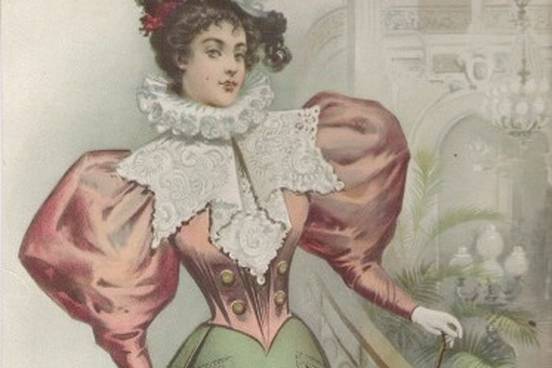
Leg-of-mutton
leg-of-mutton, adjective : having the approximately triangular shape or outline of a leg of mutton
"… a metallic striped dress that fell to midcalf and featured leg-of-mutton sleeves, which nodded to the late Seventies but was delivered in a modern silhouette."
—Mayte Allende, Women's Wear Daily, 16 February 2015
In the category of "let's make fashion sound as gross as we can" we have the adjective leg-of-mutton. Mutton refers to the meat of an adult sheep. A leg-of-mutton sleeve is shaped like one of those adult sheep's meaty legs, and you're supposed to not mind that.
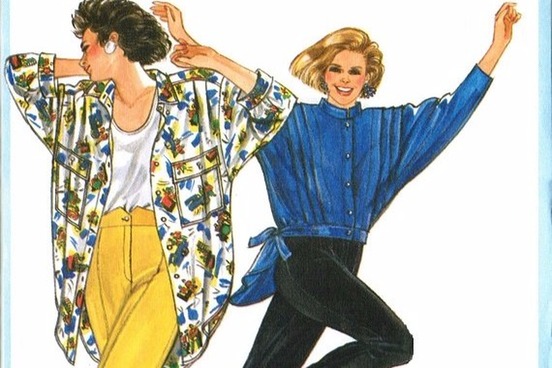
Batwing
batwing, adjective : shaped like the wing or wings of a bat: such as a of a necktie : worn in a bowknot and having ends of equal length b of a sleeve : made with a deep armhole c of chaps : having wide flared sides and snap or buckle fastenings
"From signature batwing sleeves to colorful rhinestone dresses and designer suits, the collection is a testament to [Naomi] Judd's personal style and bright presence in the country music industry."
—The Lebanon[Tennessee] Democrat, 8 September 2014
Holy deep armholes, Batman! Though the word batwing describes neckties and chaps too, it's sleeves that most often get the batwing treatment, and those sleeves have deep armholes resulting in a sleeve that has more fabric than most.
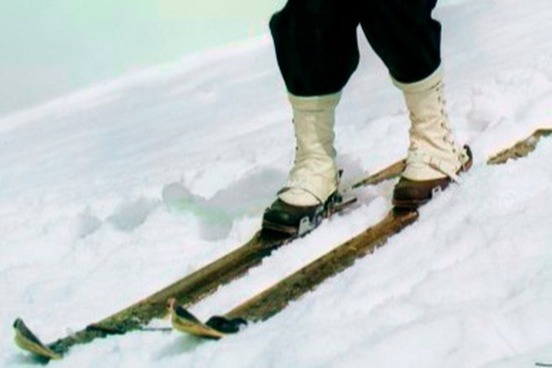
Gaiter
gaiter, noun 1 : a cloth or leather leg covering reaching from the instep to above the ankle or to mid-calf or knee 2a : an overshoe with fabric upper b : an ankle-high shoe with elastic gores in the sides
"Even on this blustery winter day, she's dressed with panache—in a tweed jacket and black suede platform boots swathed with knitted gaiters."
—Skye Sherwin, W, May 2013
The word (usually used in the plural) has a strictly utilitarian sound to it, and gaiters themselves are typically pretty utilitarian too, as skiers and snowshoers know well—they use them to keep their feet dry. But gaiters find their way onto the runway too, so it's fitting that the word's origin is French. The word guêtre was borrowed into English in the late 18th century. It has no relation to gator.
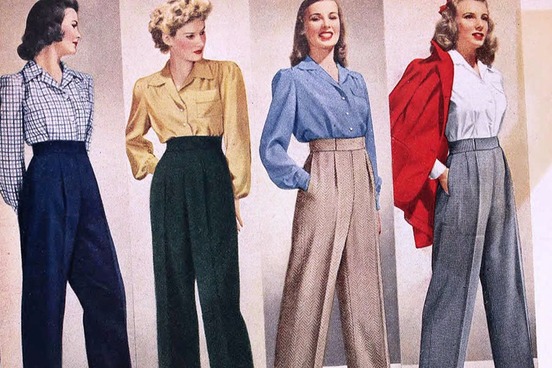
Slacks
slacks, noun : trousers especially for casual wear
"Designer Rosie Assoulin is known for dresses and slacks cut with a relaxed, oversized glamor replete with ruffles in silk faille and cotton shirting."
—Jameel Mohammed, Paper (papermag.com), 18 February 2016
"Ew, ew, ew!" you may be saying. You're not alone: slacks is one of the most hated words in the English language, which may be why the fashion mags are typically all about pants and trousers. However much people would like to remove the word slacks from the language, though, it appears to be here to stay. Etymologically, they're loose; the word that refers to pants is related to the slack that means "a part of something that hangs loose without strain," as in "take up the slack of a rope."
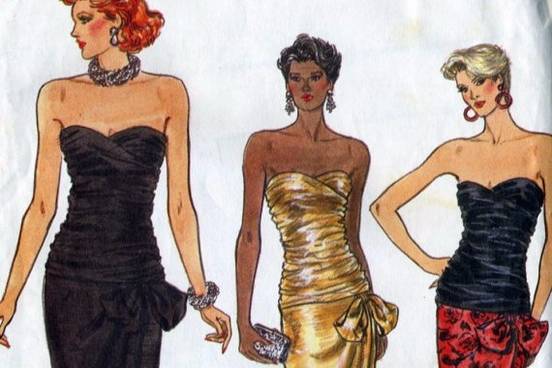
Ruche
ruche, noun : a pleated, fluted, or gathered strip of fabric used for trimming
"… we saw high-waisted, double-buttoned, wide-leg triple-pleat pants, … dresses puckered with ruche mustered by running drawstrings across various bodily contours."
—Luke Leitch, Vogue.com, 20 February 2016
You may be familiar with ruche—also referred to as ruching—but the origin of the word may surprise you. It's from the French word of the same spelling, which means literally "beehive." The adjective form of the word is ruched, as in "a ruched dress."
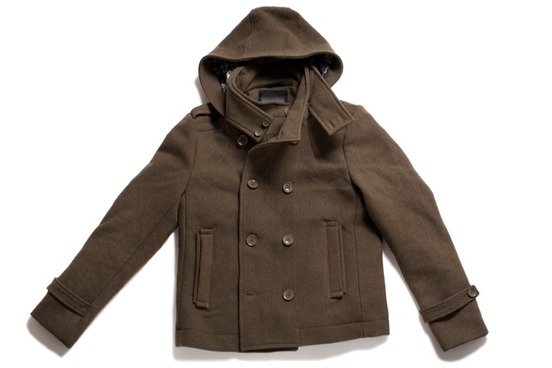
Peacoat
peacoat, noun : a heavy woolen double-breasted jacket originally worn by sailors
"There's something so timeless and chic about a peacoat, but finding the right fit can be a little tricky …"
—Lindsey Rose Black, Bustle , 29 September 2015
No vegetables were harmed in the making of that peacoat. The pea part comes from the Dutch word pij, which refers to a kind of cloth. (The term pea jacket came first, from the Dutch pijjekker; jekker means "jacket.")






